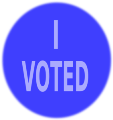Democracy
What is a democracy? A democracy is a government run by the people. Each citizen has a say (or vote) in how the government is run. This is different from a monarchy or dictatorship where one person (the king or dictator) has all the power.

There are two main types of democracies: direct and representative.
Direct - A direct democracy is one in which every citizen votes on all important decisions. One of the first direct democracies was in Athens, Greece. All of the citizens would gather to vote in the main square on major issues. A direct democracy becomes difficult when the population grows. Imagine the 300 million people of the United States trying to get together in one place to decide an issue. It would be impossible.
Representative - The other type of democracy is a representative democracy. This is where the people elect representatives to run the government. Another name for this type of democracy is a democratic republic. The United States is a representative democracy. The citizens elect representatives such as the president, members of congress, and senators to run the government.
What characteristics make up a democracy?
Most democratic governments today have certain characteristics in common. We list a few of the major ones below:
Citizens rule - We've already discussed this in the definition of democracy. The power of the government must rest in the hands of the citizens either directly or through elected representatives.
Free elections - Democracies conduct free and fair elections where all citizens are allowed to vote how they want.
Majority rule with Individual rights - In a democracy, the majority of the people will rule, but the rights of the individual are protected. While the majority may make the decisions, each individual has certain rights such as free speech, freedom of religion, and protection under the law.
Citizen participation - The citizens of a democracy must participate for it to work. They must understand the issues and vote. Also, in most democracies today, all citizens are allowed to vote. There are no restrictions on race, gender, or wealth as there was in the past.
Democracies in Reality
While democracy may sound like the perfect form of government, like all governments, it has its issues in reality. Some criticisms of democracies include:
- Only the very wealthy can afford to run for office, leaving the real power in the hands of the rich.
- Voters are often uninformed and don't understand what they are voting for.
- Two party systems (like in the United States) give voters few choices on issues.
- The large bureaucracy of democracies can be inefficient and decisions can take a long time.
- Internal corruption can limit the fairness of elections and the power of the people.
- The word "democracy" comes from the Greek word "demos" which means "people."
- The word "democracy" is not used anywhere in the U.S. Constitution. The government is defined as a "republic."
- The top 25 richest countries in the world are democracies.
- The United States is the oldest recognized democracy in the modern world.
No comments:
Post a Comment